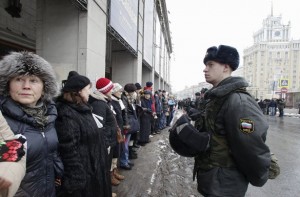After a weekend in which anti-Putin protestors united in a ring of defiance around the Kremlin, truly wacky reports have surfaced of a potential assassination plot against Prime Minister and presidential candidate Vladimir Putin, stymied by Ukrainian security forces:![]()
The Russian prime minister’s press secretary, Dmitry Peskov, told the BBC “this was absolutely a plot to kill the prime minister.”
It seems not outside the realm of possibility that Ukraine’s government, which is currently controlled by pro-Russian factions under pro-Russian president Viktor Yanukovych, could be convinced to help legitimize the gravity of the plot. Certainly, the Kremlin ploy helps to distract, in part, from anti-Putin protests just six days in advance of the first round of Russia’s presidential election.
In a piece in The Guardian yesterday, Russian oligarch Mikhail Khodorkovsky, who was jailed by Putin a decade ago and removed as CEO of Yukos Oil, advocates a vote for any of the four opponents to Putin, thereby forcing Putin into a second-round runoff vote. He compares the recent grassroots protests against Putin to the Arab Spring protests of 2011 that toppled dictators in Tunisia and Egypt:
By forcing a second round we will push our country down the path of positive change. Presidential power that previously answered to no one would have to start listening to the people it serves. The state that until now took the monopolistic presidential power for granted would be more wary of its hold and start moderating its behaviour. The politicians who gathered the opposition votes could become a force to be reckoned with, a voice for articulating the thoughts and views that have been ignored before. The establishment would have to start negotiating with the opposition and an evolutionary transition could meaningfully begin.
Given the choices of the four opponents permitted to run against Putin, this may force Russian voters to hold their noses. Those opponents include Communist party leader Gennady Zyuganov, ultranationalist Vladimir Zhirinovsky and two former Putin allies, Sergey Mironov and Mikhail Prokhorov, the latter a wealthy nickel magnate and a Kremlin-approved (if not actually Kremliln-planted) candidate. With a recent poll showing Putin taking the first-round vote with 66% of the vote, it is not clear that Putin will actually be forced into a runoff. But note that in 2000, in 2004 and in 2008, Putin (or in the case of 2008, his ally and current president Dmitri Medvedev) won first-round victories with 53.4%, 71.9% and 71.2% of the vote, respectively.
Considering that the Kremlin appears to have prevented any credible threats from running against Putin, it is barely conceivable that Putin would lose even a fair election against any of the four remaining recognized opponents.
Zhirinovsky has never won more than 9.5% of any presidential election and Zyuganov, who’s run in every post-Soviet Russian election (except for 2004) has seen his share of the vote fall from 32.5% in 1996 to 29.5% in 2000 to just 18% in 2008. With Zyuganov’s stronghold of voters initially pensioners and others yearning for a return to the Communist era, his support has fallen as greater numbers of those nostalgic Communist voters have died. Both Zyuganov and Zhirinovsky are tainted by deals made in the mid-2000s to support Putin in exchange for continued Duma influence. Neither have transformed once-formidable power blocs in the Duma into the kind of center-right nationalist movement (in the case of Zhirinovsky) or a social democratic movement (in the case of Zyuganov) that would give them wide appeal today.
The one consistent voice for a liberal democratic Russia, Grigori Yavlinsky, who’s also contested presidential elections since 1996 (to less than enthusiastic resposes from the Russian electorate), was disqualified on ballot signature technicalities.
Khodorkovsky may be in fact right that forcing Putin into a second-round runoff would be a small victory for a more democratic Russia, but the future of Russian democracy will depend more on what happens with those protestors outside the Kremlin over the next few weeks and what happens inside the Kremlin, in response, in the next few years.
